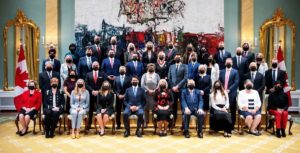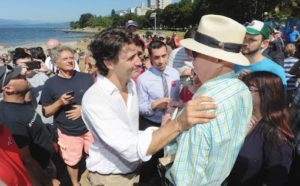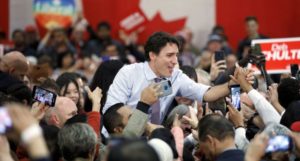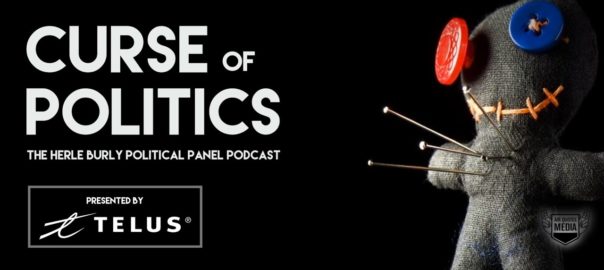
At the end of Tuesday’s Curse of Politics podcast, politico Scott Reid intones …
“Anybody who thinks this is Justin Trudeau’s last term in office, and that sometime before 2024 he’s going to resign as Prime Minister is a fool. That sort of punditry is nothing but lazy ass journalism. There’s absolutely no evidence to support that thesis. Why would you want to resign from the most important elected office in Canada, where change for the better that can be wrought with you at the helm? Never mind all the perks of the office. Those folks just oughta get over themselves, and stop that shit. It serves nobody’s interests. Fuck those assholes.”
Welcome to VanRamblings’ political world — it ain’t an easy life, lemme tell ya.

The 2015 campaign for office, with future Prime Minister Justin Trudeau at English Bay
VanRamblings has long believed that Justin Trudeau is a reluctant Prime Minister, who would rather spend time with his family, enjoying a life out of the public eye. Even so, Mr. Trudeau believes that he is uniquely positioned to both make a difference, and to maintain his father’s legacy of a fairer and more just Canada. For now, and the foreseeable future, he will make the sacrifices necessary, in order to maintain his family’s progressive vision for our nation.
In 2003, when Prime Minister Jean Chrétien tendered his resignation as Prime Minister of Canada, the first murmurings of what became known as the “AdScam Scandal” — involving illicit activities established to a fight a Parti Québécois government’s dreams of Québec independence, with tens of millions of dollars awarded to Liberal Party-linked ad firms in return for little or no work, where these ad firms maintained Liberal organizers, while donating much of their awarded monies back to Liberal party coffers — when in late 2005 a …
“Commission of Inquiry into the Sponsorship Program and Advertising Activities, headed by Justice John Gomery — which came to be known as “the Gomery Commission” — reported out, the Commission found that millions had been awarded in contracts without a proper bidding system, that millions more had been awarded for work that was never done, and that the Financial Administration Act had repeatedly been breached by the Liberal party government of Joseph Jacques Jean Chrétien.”
The death knell of federal Liberal governments for a generation was sounded.
Liberal Prime Minister Paul Martin lost the election he called in late 2005. The next federal Liberal Party leader, Stéphane Dion, lost again in the 2008 Canadian federal election, and in 2011 Liberal leader Michael “he’s just visiting” Ignatieff’s campaign saw the Liberals reduced to 34 meagre, ignominious seats, and fourth party status.
In late 2012, at the behest of family and longtime friends, political strategists Gerald Butts and Katie Telford — both senior policy advisors to Ontario Liberal Party leader Dalton McGuinty, dating back to 1999 — approached their former schoolmate and friend of some two decades, Justin Trudeau, and asked him to consider a run for the leadership of the federal Liberal Party of Canada.
On Sunday, April 14th, 2013, the son of former Canadian Prime Minister Pierre Elliott Trudeau, not only won his leadership bid, with 80.1% of the vote to 10.2% for British Columbia MP Joyce Murray, his victory more a coronation.

Two and one half years later, on October 15, 2015, 42-year-old Justin Pierre James Trudeau was elected the 23rd Prime Minister of Canada, having mounted a stunning, come from behind victory that saw the Liberal Party form a strong majority government of 184 seats in the House of Commons in Ottawa.
And since that day, Prime Minister Trudeau has not known a moment’s peace.
The governments of Justin Trudeau have wrought change for the better.
- The Canada Child Tax Benefit has provided thousands of dollars more to 9 out of 10 Canadians families, lifting more than 40% of Canadian families out of poverty;
- Marijuana and its by-products have been legal in Canada since 2017;
- Tax cuts for middle class families, not the wealthy, have benefited 9 million Canadian families each year for the past six years;
- After 10 years of Prime Minister Stephen Harper muzzling scientists in the Environment and Fisheries and Oceans department, and across his government, federal scientists have, since 2015, been afforded the opportunity to speak openly on government policy;
- The Trudeau government has quadrupled funding for women’s shelters;
- $9 billion to train thousands of new, highly-paid personal support workers;
- Mark Jaccard, a professor of sustainable energy at Simon Fraser University’s School of Resource and Environmental Management has written that the federal Liberal Party climate action plan is a “world best,” with the government’s closure of coal plants, and a carbon tax that will see greenhouse gas emissions in Canada reduced by 40% by 2030, among myriad other world leading initiatives;
- Through the introduction of Bill C-14, the federal government introduced legalized medical assistance in dying, offering Canadians the choice to die with dignity to patients who are suffering intolerably.
Re-opening the Kitsilano Coast Guard base; providing support to 450,000 students by increasing Canada Student Grants by 50%; reopening and staffing nine Veterans Affairs service offices across the country — these are just a few of the accomplishments of the governments of Justin Trudeau over the past six years in what has emerged as one of the most progressive governments anywhere across the planet.
And yet, you just can’t get away from feeling that Justin Trudeau’s continuing sacrifice of the joys of a private life, and time with his family and friends, weighs ever more heavily on him with each passing day, the relentless attacks by the opposition parties and right-wing media (“Hello, Brian Lilley“), with the support of only 33.12% of Canadians at the polls in this most recent election — despite his 159-seat minority government win — ever more unbearable.
For however long this Parliament lasts, in what may be Mr. Trudeau’s final term in office, the next years will be ‘legacy years’ for his government on the issue of the environment — which is why, on Tuesday, he appointed Greenpeace activist and respected Québec environmentalist Steven Guilbeault as his newly-minted Minister of Environment and Climate Change, and the former activist Minister who held the portfolio, Jonathan Wilkinson, as the new Minister of Natural Resources, both Ministers set to work in tandem to address the issue of oil and gas extraction, and dedicated to moving Canada away from the extraction of fossil fuels.
A pan-Canadian, legacy $10-a-day child care plan already signed onto by seven provinces and one territory, with the Ontario government just wrapping up negotiations with the federal government, and both Alberta and New Brunswick, and the two other territories not far behind; $2.7 billion in increased funding for the National Housing Co-investment fund; $3 billion over five years to support the application of higher standards for long-term care homes; unprecedented investment in public transporation, from buses, commuter rail, and a 21st-century high-speed system of regional train systems; $18 billion over 5 years to improve quality of life and create new opportunities for people in Indigenous communities, while completing the work on eliminating boiled water advisories on Indigenous lands; 10 days of paid sick leave for federal workers; funding for improved ventilation in schools and legal protection for businesses that decide to require vaccinations — represent just a few of the necessary initiatives of the Trudeau government.
Scott Reid, Jenni Byrne and David Herle present below the most cogent analysis of the “shuffle” of the Trudeau Cabinet yesterday morning, in this third — and maybe, final — term of the Justin Pierre James Trudeau-led Canadian federal government.
